
Chang: A Drama of the Wilderness (1927)
DIRECTED BY: Merian C. Cooper, Ernest B. Schoedsack
STARRING: Kru, Chantui, Bimbo the Monkey
NOMINATED FOR: Best Picture, Unique and Artistic Production
I've been having a hard time coming up with a proper opening for this review. I first started writing a history of documentary films, then tried defining documentary films, but it wasn't coming out the way I wanted. When I think about it, I realize that what I was trying to do was to find some justification for Chang: A Drama of the Wilderness. The fact is, Chang is not a documentary, and for that fact more then anything else, I didn't like it.
It's not like directors Merian C. Cooper and Ernest B. Schoedsack didn't know it's not a documentary. They advertised it as a "jungle melodrama" and never once claimed it as actual fact. Almost all the events in the film are staged, those not being just filler shots of monkeys running around trees. This idea of staged foreign drama found it's start in Robert J. Flaherty's Nanook of the North from 1922, in which Flaherty filmed actual Eskimos performing more ancient forms of fishing and hunting (for example, the film showed Eskimos using spears, when they would normally use guns).
Chang is only slightly better. It too uses locals to recreate events, but the events are ones that could actually happen at that time period, but were staged for the film. Now, this in itself is not my problem, particularly since it's not officially advertised as a documentary.
My main problem is all the fucking animal killing.
I know, I know, "it was a different time," a pre-"no animal was harmed during the making of his film" time. It would be another twelve years before the American Humane Association became involved in the film business. I accept this, and I can still recognize the impact of the film, but none of that doesn't mean I have to like it. I also recognize the impact of The Birth of a Nation, but I'll be damned if I have to like that racist piece of shit.
Ok, Chang ain't The Birth of a Nation bad.
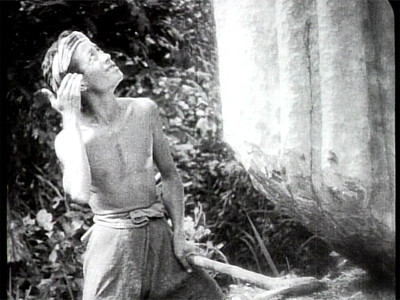
The film takes place in Siam (now Thailand), where a group of natives live a dangerous kill-or-be-killed life in the jungle. The film likens it to to the covered wagon migrations of the United States, promoting a Western man-vs-nature tone throughout the film. Our main character is Kru (played by an actual man named Kru), a humble jungle citizen. He lives with his wife and his three children (his actual children, though not his actual wife) in a small, almost-suburban jungle house.
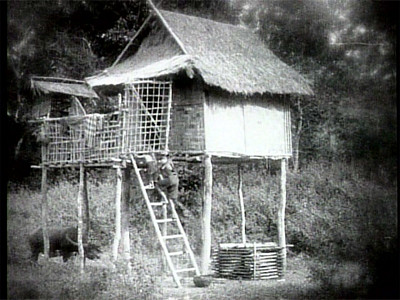
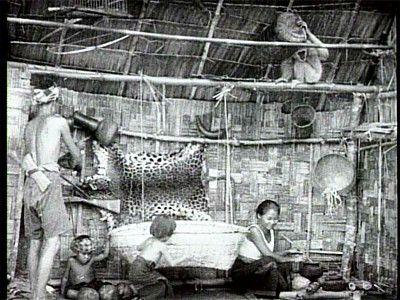
They even have a family pet, Bimbo the monkey, who's easily the best character of the film.
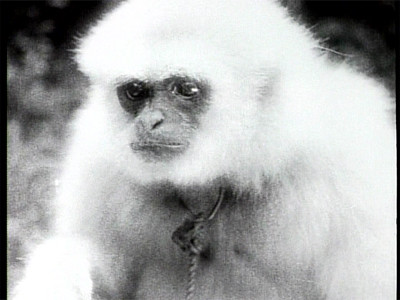
His has more dialogue then any other character in the film, thanks to the intertitles. His character is greedy and cowardly and funny, starting a tradition of comedy relief animal sidekicks you know find in just about every film made by Disney.
However, the film doesn't focus a great deal on the family life. The majority of it fallows Kru and his fellow villagers as they deal with a series of dangerous jungle animals, the king of which being the "bloodthirsty" tiger.
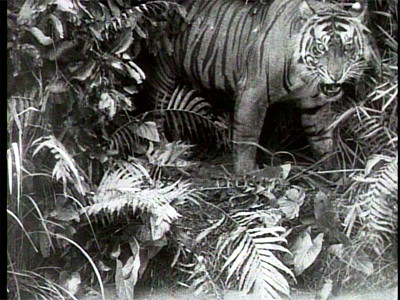
The film presents the carnivores in this film almost in an evil light, to further heighten the drama. Steve Irwin would not approve. The tiger, while the most dangerous animal in the film, was a rare creator for the filmmakers to encounter, so the majority of the film was focused on leopards.

Leopards are the stormtroopers of this film: they never stop showing up, and they never stop dying.
In the middle of the film, the villagers set up a large number of traps for the leopards, ranging from pitfalls to snares to nets.
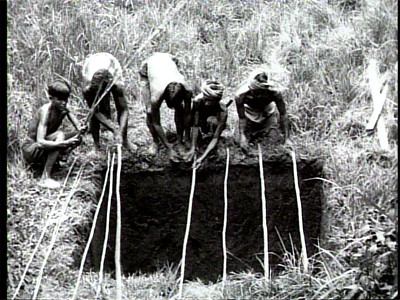


These are all fine and good, but they all pale in comparison to THE DEATH SLAB!

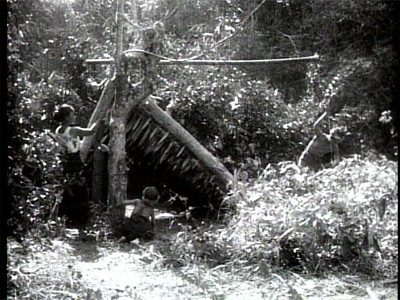
HOOOOL-EEEEE SHIT!
Fortunately, we never see any animal get trapped by that thing in the film. We do see plenty of leopards and tigers get caught in the other traps though, which result in the villagers running up and shooting the animals to death. We see the bullet impacts, we see the animal's death twitches, and I have to stop the film for a while.
It's this point where the film not being a for-real documentary becomes a problem. If this had merely been the recording of actual events, then I could say nothing about it except "welp, dem's the breaks." But the events are staged and the animals killed for entertainment. You could say that the events would have happened on their own, but that just makes it worse. If these things would have happened on their own, then why the hell couldn't Cooper and Schoedsack not film them HAPPENING ON THEIR OWN!?!
I think I've said my piece.

No comments:
Post a Comment